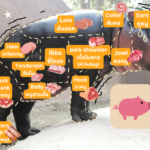| 入 | - (しお) (suf,ctr) (arch) counter for soakings (of fabric in a dye) [EDICT]
- (rù, ㄖㄨˋ) to enter; entering tone (classical Chinese) [CE-DICT]
|
| 茜 | - (あかね;アカネ) (n) (1) (uk) madder (esp. Japanese madder, Rubia argyi); (2) madder (red color) [EDICT]
- (qiàn, ㄑㄧㄢˋ) Rubia cordifolia; Indian madder; munjit [CE-DICT]
|
| 試 | - (shì, ㄕˋ) to test; to try; experiment; examination; test [CE-DICT]
|
| で | - () (aux) (abbr) (arch) (See である) to be [EDICT]
- () (n) (sl) detective [EDICT]
- () (aux) (pol) (See だ・1) polite copula in Japanese; (P) [EDICT]
- () (conj,int) (See それでは) then; well; so; well then; (P) [EDICT]
- () (conj) (1) but; however; though; nevertheless; still; yet; even so; (prt) (2) even; (3) however; no matter how; even if; even though; (4) ... or something; (5) (as 〜でも〜でも) either ... or ...; neither ... nor ...; (pref) (6) (before an occupation, etc.) pseudo-; quack; in-name-only; (7) (before an occupation, etc.) (See でもしか) for lack of anything better to do; (P) [EDICT]
- (出) (n,n-suf) (1) coming out; going out; outflow; efflux; rising (of the sun or moon); (2) attending (work); appearing (on stage); one's turn to go on; (3) start; beginning; (4) origins; background; person (or item) originating from ...; graduate of ...; native of ...; member of ... (lineage); (5) architectural member that projects outward; (6) highest point of the stern of a ship; (7) (uk) (usu. after the -masu stem of a verb as 〜出がある or 〜出がない, etc.) amount (comprising something); amount of time or effort required to do something; (P) [EDICT]
|
| う | - () (int) (arch) (See うん) yea; uh huh [EDICT]
- () (int) (1) yeah; uh huh; (n-pref) (2) (also ん) some (at the start of a number in place of a digit); (P) [EDICT]
- () (aux-v) (1) (arch) (See んとする) will probably be; (2) intending to; will; (3) should [EDICT]
- (宇) (ctr) counter for buildings, etc. [EDICT]
- (羽) (n) (See 五音) fifth degree (of the Japanese & Chinese pentatonic scale) [EDICT]
- (鵜) (n) cormorant [EDICT]
- (得) (v2a-s,vt) (1) (See 得る・うる) to get; to acquire; to obtain; to procure; to earn; to win; to gain; to secure; to attain; (2) (as 〜することを得, etc.) to be possible [EDICT]
- (有) (n) {Buddh} bhava (becoming, existence) [EDICT]
|
| は | - (葉) ใบไม้ [LongdoJP]
- () (int) (1) (pol) yes; (2) OK (used to get attention prior to an utterance); okay; (3) giddy-up; giddap; (P) [EDICT]
- () (v5r,aux-v,suf) (hon) (ksb [EDICT]
- () (suf) (ksb [EDICT]
- (歯) (n) tooth; (P) [EDICT]
- (刃) (n) edge (of a knife or sword); (P) [EDICT]
- (派) (n,n-suf) clique; faction; school; (P) [EDICT]
- (破) (n) (See 序破急) (in gagaku or noh) middle section of a song [EDICT]
- (葉) (n) leaf; (P) [EDICT]
|
| こ | - (子) เด็ก [LongdoJP]
- () (suf) (1) (abbr) (See 事・こと・6,慣れっこ,ぺちゃんこ・1) doing; in such a state; (2) (See 睨めっこ・1) doing together; contest; match; (3) (fam) (See 餡こ・1) familiarizing suffix (sometimes meaning "small") [EDICT]
- () (prt) for sure (emphasize preceding word); (P) [EDICT]
- () (prt) (1) (particle always used at sentence-end) particle indicating a command; (2) (fem) (often as ことね) particle indicating mild enthusiasm; (3) particle indicating a gentle interrogative; (4) (at sentence end as ことよ) particle used to soften a judgment or conclusion [EDICT]
- () (conj,int) (1) interjection meant to scold or reprove someone; hey!; (2) interjection to call out to someone; hey! [EDICT]
- () (int) (used to get the attention of one's equals or inferiors) hey; oi; yo [EDICT]
- () (n) (obsc) (See ころコンベヤ,ころ軸受け) roller; runner; dried whale blubber [EDICT]
- () (adv-to) (1) (See こつんと) the sound that something makes when it is hit; with a bump; (2) yelp (e.g. of a fox); bark; howl [EDICT]
- (個) (ctr) (1) counter for articles; (2) (usu. 個) counter for military units; (3) individual; (P) [EDICT]
- (箇) (ctr) (1) counter for articles; (2) (usu. 個) counter for military units; (3) individual; (P) [EDICT]
- (弧) (n) arc [EDICT]
- (戸) (ctr) counter for houses [EDICT]
- (故) (pref) the late (deceased) [EDICT]
- (湖) (suf) lake (in place names) [EDICT]
- (胡) (n) (arch) barbarian tribes surrounding ancient China [EDICT]
- (子) (n,n-suf) (1) child; (2) (also 仔) young (animal); (3) (also 娘) young woman; young geisha; (4) offshoot; (5) (See 元も子もない) interest; (6) (abbr) (See 子株・2) new shares; (7) (arch) bird egg; (n-suf) (8) (after a noun or -masu stem) -er (often of young women); (P) [EDICT]
- (児) (n,n-suf) (1) child; (2) (also 仔) young (animal); (3) (also 娘) young woman; young geisha; (4) offshoot; (5) (See 元も子もない) interest; (6) (abbr) (See 子株・2) new shares; (7) (arch) bird egg; (n-suf) (8) (after a noun or -masu stem) -er (often of young women); (P) [EDICT]
- (小) (pref) (1) (See 小皿) small; little; slight; (2) (See 小半日,弱・じゃく・2) slightly less than; just about; (3) (See こざっぱり) somewhat; somehow; (4) (See 小役人) minor (sometimes derogatory); petty [EDICT]
- (濃) (pref) dark; thick [EDICT]
- (壺) (n) hu (ancient Chinese vessel shaped like a vase, usually used to store alcohol) [EDICT]
- (壷) (n) hu (ancient Chinese vessel shaped like a vase, usually used to store alcohol) [EDICT]
|
| 法 | - (ほう) (n,n-suf) (1) law; act; principle; (2) method; (3) {ling} mood; (4) {Buddh} dharma; (P) [EDICT]
- (fǎ, ㄈㄚˇ) law; method; way; Buddhist teaching; Legalist; abbr. for France [CE-DICT]
|
| 現 | - (げん) (pref) present; current [EDICT]
- (うつつ) (n) reality; consciousness [EDICT]
- (xiàn, ㄒㄧㄢˋ) appear; present; now; existing; current [CE-DICT]
|
| 技 | - (わざ(P);ぎ) (n) technique; art; (P) [EDICT]
- (jì, ㄐㄧˋ) skill [CE-DICT]
|
| 表 | - (おもて) (n) (1) (ant [EDICT]
- (ひょう) (n,n-suf) table (e.g. Tab 1); chart; list; (P) [EDICT]
- (biǎo, ㄅㄧㄠˇ) exterior surface; family relationship via females; to show (one's opinion); a model; a table (listing information); a form; a meter (measuring sth) [CE-DICT]
- (biǎo, ㄅㄧㄠˇ) a wrist watch or pocket watch [CE-DICT]
|
| ろ | - () (n) (col) (See 只) free [EDICT]
- (櫓) (n) Japanese scull (oar attached to the rear of the boat by a traditional peg-in-hole oarlock) [EDICT]
- (艪) (n) Japanese scull (oar attached to the rear of the boat by a traditional peg-in-hole oarlock) [EDICT]
- (炉) (n) (1) hearth; fireplace; (2) furnace; kiln [EDICT]
- (絽) (n) type of silk gauze [EDICT]
|
| の | - () (prt) endorsing and questioning the preceding statement (sentence ending particle); lamenting reflections on the preceding statement (sentence ending particle) [EDICT]
- () (prt) (1) although; when; and yet; despite this; in spite of; even though; but even so; but even then; however; nevertheless; for all that; notwithstanding that; (2) while; (3) if only; I wish; (4) I tell you; you should do; (5) in order to; (P) [EDICT]
- () (suf,prt) (literary equiv. of だけ) only; nothing but; (P) [EDICT]
- () (n) (See スラグ) slag [EDICT]
- (乃) (prt) (1) (uk) (occasionally ん) indicates possessive; (2) verb and adjective nominalizer (nominaliser); (3) substituting for "ga" in subordinate phrases; (4) (often ん) indicates a confident conclusion; (5) emotional emphasis (sentence end) (fem); (6) indicates question (sentence end); (P) [EDICT]
- (之) (prt) (arch) possessive (used on tombs, etc.) [EDICT]
- (幅) (n,n-suf,ctr) (after a number in the hito-, futa-, mi- counting system) unit of measurement for cloth breadth (30-38 cm) [EDICT]
- (布) (n,n-suf,ctr) (after a number in the hito-, futa-, mi- counting system) unit of measurement for cloth breadth (30-38 cm) [EDICT]
- (箆) (n) (1) (arch) shaft (of an arrow); (2) (arch) (See 矢竹・2) arrow bamboo (Pseudosasa japonica) [EDICT]
- (篦) (n) (1) (arch) shaft (of an arrow); (2) (arch) (See 矢竹・2) arrow bamboo (Pseudosasa japonica) [EDICT]
|
| に | - (二) สอง [LongdoJP]
- () (prt) indicates location of action (formal literary form of "de"); at; in; (P) [EDICT]
- () (prt) (See に,は) for (in regard to); in order to [EDICT]
- () (exp) also; too; not ... either; as well; even [EDICT]
- () (exp) (1) (also にゃあ) (See ねば) if not ... (negative conditional); (2) (See には) for (in regard to); in order to [EDICT]
- (荷) (n) (1) load; baggage; cargo; freight; goods; (2) burden; responsibility; (P) [EDICT]
- (似) (suf) takes after (his mother) [EDICT]
- (丹) (n) red earth (i.e. containing cinnabar or minium); vermilion; (P) [EDICT]
- (土) (n) (arch) soil (esp. reddish soil) [EDICT]
- (尼) (n,n-suf) (abbr) (See 比丘尼) bhikkhuni (fully ordained Buddhist nun) [EDICT]
- (弐) (num) two (used in legal documents) [EDICT]
|
| こと | - () (adv-to) (on-mim) clunk; thump [EDICT]
- (古都) (n) ancient city; former capital; (P) [EDICT]
- (糊塗) (n,vs) covering up; glossing over [EDICT]
|
| 題 | - (だい) (n) (1) title; subject; theme; topic; (2) problem (on a test); question; (n-suf,ctr) (3) counter for questions (on a test); (P) [EDICT]
- (tí, ㄊㄧˊ) topic; problem for discussion; exam question; subject; to inscribe; to mention; surname Ti [CE-DICT]
|
| 線 | - (せん) (n,n-suf) (1) line; stripe; stria; (2) line (e.g. telephone line); wire; (3) (See X線) ray (e.g. X-ray); beam; (4) line (e.g. of a railroad); track; route; lane; (5) outline; contours; form; (6) level; (7) division; (8) (See いい線) line (of action); position; approach; policy; principle; (9) (See 線が太い,線が細い) impression one leaves; air one gives off; (P) [EDICT]
- (xiàn, ㄒㄧㄢˋ) thread; string; wire; line [CE-DICT]
|
| て | - () (conj) (col) (See と言うか) or rather (say); or better (say); or perhaps I should say; or, how should I put it,...; I mean [EDICT]
- () (prt) a sort of thing like; used after a phrase to modify the following noun [EDICT]
- () (prt) (1) (also でも, っても) even if; even though; (int) (2) (abbr) (See さても) wow [EDICT]
- (手) (n) (1) (occ. pronounced た when a prefix) (See お手・おて・1) hand; arm; (2) (col) (See お手・おて・3) forepaw; foreleg; (3) handle; (4) hand; worker; help; (5) trouble; care; effort; (6) means; way; trick; move; technique; workmanship; (7) hand; handwriting; (8) kind; type; sort; (9) (See 手に入る) one's hands; one's possession; (10) (See 手に余る) ability to cope; (11) hand (of cards); (12) (See 山の手・1) direction; (P) [EDICT]
|
| 引 | - (yǐn, ㄧㄣˇ) to draw (a bow); to pull; to stretch sth; to extend; to lengthen; to involve in; to attract; to lead; to guide; to divert (water); unit of distance equal to 10 丈[zhang1], now one-thirtieth km or 33.33 meters [CE-DICT]
|
| すたる | - (廃る) (v5r) to go out of use; to become obsolete; to die out; to go out of fashion [EDICT]
|
| れる | - () (aux-v,v, ) (1) (れる for 五段 verbs, られる for 一段. Follows the imperfective form of (v5) and (vs) verbs) (See 未然形,迷惑の受身・めいわくのうけみ) indicates passive voice (inc. the "suffering passive"); (2) (no imperative form. Infrequently used in modern Japanese, e.g. 歩ける is favoured over 歩かれる) (See ら抜き言葉・らぬきことば) indicates the potential form; (3) (no imperative form) indicates spontaneous occurrence; (4) (hon) (no imperative form) used as an honorific for others' actions [EDICT]
|
| だ | - () (prt) (1) (as …たり…たり, after the ren'youkei forms of multiple verbs) -ing and -ing (e.g. "coming and going"); (2) (used adverbially) doing such things as...; (3) (as …たり…たり at sentence-end, after the ren'youkei forms of a repeated verb) expresses a command; (aux-v) (4) (たり only) (arch) (from とあり) (See たる) (after a noun) to be; (5) (たり only) (arch) (from 〜てあり, after the ren'youkei form of a verb) indicates completion or continuation of an action; (P) [EDICT]
- () (prt) (1) (fam) marks wh-question (what, where, who); (2) (chn) strengthens one's judgment or conclusion; (P) [EDICT]
- () (exp) if it's the case; (P) [EDICT]
- () (prt) even [EDICT]
- () (suf,prt) and; or; and the like; and so forth; and what not; (P) [EDICT]
- () (exp) (1) (See でしょう) seems; I think; I guess; I wonder; I hope; (2) don't you agree?; I thought you'd say that!; (P) [EDICT]
- () (n) (col) (abbr) (See 友達) friend [EDICT]
- () (n) undercut (of a machined edge) [EDICT]
- (駄) (pref) (1) (See 駄文・1) poor; low-grade; trivial; insignificant; worthless; (n-suf,ctr) (2) (See 一駄) load; pack; horse load; (n) (3) packhorse [EDICT]
- (兌) (n) dui (one of the trigrams of the I Ching [EDICT]
|
| 問 | - (もん) (suf,ctr) counter for questions; (P) [EDICT]
- (とい) (n) question; query; (P) [EDICT]
- (wèn, ㄨㄣˋ) to ask [CE-DICT]
|
| 傍 | - (そば(側;傍)(P);そく(側);はた) (n) (1) near; close; beside; vicinity; proximity; besides; while; (2) (はた only) third person; (P) [EDICT]
- (bàng, ㄅㄤˋ) near; approaching; to depend on; (slang) to have an intimate relationship with sb; Taiwan pr. pang2, bang1, bang4 [CE-DICT]
|
| が | - () (prt) (positive sentence end) I dare say; (negative sentence end) though, honestly [EDICT]
- () (suf,v5r) (1) to feel (on adj-stem to represent a third party's apparent emotion); (2) to behave as if one were [EDICT]
- () (n) scree [EDICT]
- () (adv-to) (1) (on-mim) thump; thud (dull sound representing something being hit); (2) severe; difficult; hard [EDICT]
- (我) (n) (1) {Buddh} obstinacy; (2) atman; the self; the ego [EDICT]
- (画) (n) picture; drawing; painting; sketch [EDICT]
- (蛾) (n) moth [EDICT]
- (賀) (n) (See 賀の祝) congratulation [EDICT]
- (雅) (n,adj-na) (1) (ant [EDICT]
|
| ま | - () (aux) (1) probably isn't (doesn't, won't, etc.); (2) don't (doesn't) intend to; intend not to; (3) must not; (when used in an imperative sentence) don't [EDICT]
- () (aux-v) (1) (pol) (See ませ) used to indicate respect for the listener (or reader); (2) (arch) (hum) used to indicate respect for those affected by the action [EDICT]
- () (aux) (1) (pol) (See ます) (used to make a polite request or demand) please; (2) used to increase the politeness of a greeting, apology, etc. [EDICT]
- (間) (n) space; room; time; pause; (P) [EDICT]
- (真) (n,pref) just; right; due (east); pure; genuine; true [EDICT]
- (魔) (n) (1) demon; devil; evil spirit; evil influence; (n-suf) (2) (See 覗き魔) someone who (habitually) performs some (negative) act; (P) [EDICT]
|
| か | - () (n) cawing (of a crow) [EDICT]
- () (prt) (fam) marks yes-no question; (P) [EDICT]
- () (prt) (1) (ksb [EDICT]
- () (prt) interrogative sentence-ending particle expressing doubt; (P) [EDICT]
- () (prt) (abbr) (See かもしれない) may; might; perhaps; may be; possibly [EDICT]
- () (prt) (See か,よ) sentence-ending particle expressing doubt [EDICT]
- () (prt) (1) from (e.g. time, place, numerical quantity); since; (2) from (originator); (3) because; (4) out of (constituent, part); (5) through (e.g. window, vestibule); (6) after; since (following te-form verb); (P) [EDICT]
- (下) (suf) under (being in said condition or environment) [EDICT]
- (化) (suf) (See 化する) action of making something; -ification [EDICT]
- (佳) (adj-na,n) beautiful; good; excellent [EDICT]
- (加) (n) (1) addition; increase; (2) (abbr) (See 加奈陀) Canada; (P) [EDICT]
- (可) (n,n-suf) passable; acceptable; tolerable; fair; (P) [EDICT]
- (夏) (n) Xia (dynasty of China; perhaps mythological) [EDICT]
- (家) (suf) (See 政治家) -ist (used after a noun indicating someone's occupation, pursuits, disposition, etc.); -er [EDICT]
- (科) (n,n-suf) (1) department; section; (2) (taxonomical) family; (P) [EDICT]
- (果) (n) (1) {Buddh} (See 因・2) phala (attained state, result); (2) {Buddh} (See 悟り・2) enlightenment (as the fruits of one's Buddhist practice); (3) (See 果物) fruit; (ctr) (4) counter for pieces of fruit [EDICT]
- (架) (n) unit of equipment; rack [EDICT]
- (火) (n) (1) (abbr) (See 火曜) Tuesday; (2) (See 五行・1) fire (second of the five elements) [EDICT]
- (荷) (suf,ctr) counter for loads (that can be carried on one's shoulders) [EDICT]
- (菓) (n) (1) (arch) fruit; (suf,ctr) (2) counter for fruit [EDICT]
- (課) (n,n-suf) (1) lesson; (2) section (in an organization); division; department; (ctr) (3) counter for lessons and chapters (of a book); (P) [EDICT]
- (過) (pref) (1) surplus- (attaches to start of Sino-Japanese words); excess-; over-; (2) per- (chemical with more of a certain element than found in other compounds of the same constituents) [EDICT]
- (蚊) (n) mosquito; (P) [EDICT]
- (香) (n) smell (esp. a good smell); fragrance; scent; aroma; perfume [EDICT]
- (日) (n-suf) (1) day of month; (ctr) (2) counter for days [EDICT]
- (戈) (n) ge (ancient Chinese dagger-axe) [EDICT]
- (顆) (n) (1) condyle; (ctr) (2) (arch) counter for grains and small spheres [EDICT]
|







